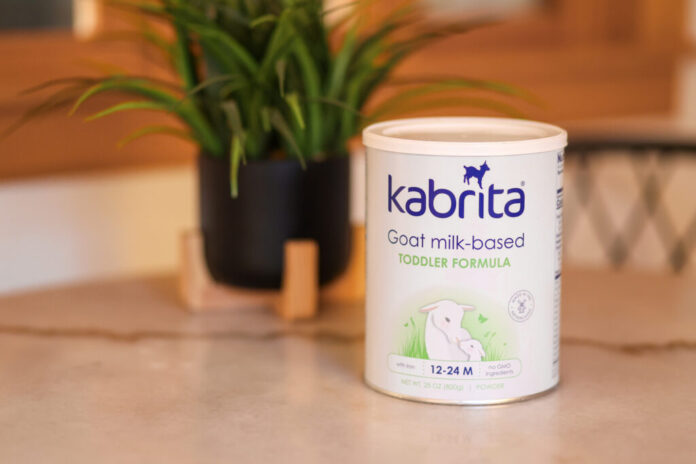As a new parent, you want to ensure your baby receives the best possible nutrition. When choosing between Kabrita Stage 1 Goat Milk Infant Formula and Cow’s Milk Formula, there are several factors to consider.
What is the Kabrita Formula?
It is a goat milk-based infant formula specifically designed to meet the nutritional needs of babies. Kabrita Stage 1 is suitable for babies from birth to six months and contains all the essential nutrients needed for healthy growth and development.

What is Cow’s Milk Formula?
It is another popular choice for infants. Like Kabrita, it is designed to meet the nutritional needs of babies and is suitable for infants from birth to 12 months.
Differences between Kabrita Formula and Cow’s Milk Formula
While both of them are designed to meet the nutritional needs of babies, there are some critical differences between the two.
Kabrita is made with goat milk, which is easier to digest than cow’s milk. It also contains prebiotics, which can help support a healthy gut microbiome. Cow’s Milk, on the other hand, is often more affordable and contains high levels of protein and iron

Protein Content
One of the main differences between the Kabrita Goat Milk Formula and Cow’s Milk Formula is the protein content. Cow’s Milk typically contains higher protein levels than goat milk-based ones. While protein is essential for a baby’s growth and development, too much protein can strain the kidneys and digestive system.
Fat Content
Both of them have similar fat content, crucial for a baby’s brain and nervous system development. Kabrita Stage 1 contains medium-chain fatty acids (MCFAs) that are easily absorbed and digested. On the other hand, Cow’s Milk contains long-chain fatty acids (LCFAs) that take longer to digest.
Lactose Content
Lactose is a sugar found in breast milk and most infant formulas. Kabrita Stage 1 Goat Milk has a lactose content similar to breast milk, making it an ideal choice for babies sensitive to lactose. Cow’s Milk Formula, on the other hand, contains higher levels of lactose, which may not be suitable for lactose-intolerant babies.

Ease of Digestion
Goat milk-based ones are known to be easier to digest compared to cow milk-based ones. Kabrita is gentler on a baby’s digestive system and may be a better choice for babies prone to digestive issues. Cows’ protein can be harder to digest, especially for babies with sensitive digestive systems.
Determing sensitivity and allergy
Determining if a baby has a cow’s milk sensitivity or allergy can be challenging, as the symptoms can be similar to other conditions. However, there are some common signs to look out for that may indicate a sensitivity or allergy.
Symptoms of a cow’s milk sensitivity or allergy may include digestive issues such as diarrhea, constipation, bloating, or gas. The baby may also experience skin issues such as eczema, hives, or rashes. In more severe cases, the baby may experience respiratory issues such as wheezing, coughing, or difficulty breathing.
If a parent suspects that their baby has a cow’s milk sensitivity or allergy, it is important to consult with a healthcare provider. The healthcare provider may recommend an elimination diet, where the baby is fed a specialized formula that does not contain cow’s milk protein to see if symptoms improve.
In some cases, further testing may be necessary to confirm a cow’s milk sensitivity or allergy. This may involve a skin prick test or a blood test to check for the presence of specific antibodies.

Consult with a Healthcare Provider
Consulting with a healthcare provider when choosing a formula for your baby is an important step in ensuring that your baby receives appropriate nutrition. Healthcare providers can provide guidance on which one is best suited to your baby’s nutritional needs, based on factors such as their age, weight, and any medical conditions they may have.
Additionally, healthcare providers can help identify any allergies or sensitivities that your baby may have and recommend a specialized formula if necessary. They can also provide guidance on how to prepare and store it safely to prevent contamination and ensure that the baby is receiving the appropriate amount of nutrition.
Consulting with a healthcare provider can also help parents feel more confident and secure in their formula choice, as they can address any questions or concerns they may have. This can be especially important for first-time parents who may be unfamiliar with the various types available and their nutritional composition.

How to switch from cow’s milk formula to Kabrita formula.
Switching from cow’s milk-based formula to the Kabrita formula requires careful consideration and monitoring. It is recommended to gradually introduce Kabrita formula into the baby’s diet, under the guidance of a healthcare professional. Slowly incorporating Kabrita formula into the baby’s diet will allow their digestive system to adjust to the new formula.
One strategy is to begin by substituting one feeding per day with Kabrita, such as midday feeding, for a few days, then gradually increasing the number of Kabrita feedings as the baby adjusts.
During the transition period, it is important to observe the baby’s response to the new formula. Parents should look for any signs of digestive issues, such as changes in bowel movements, and monitor the baby’s appetite and sleep patterns.
In addition, parents should adhere to the manufacturer’s instructions when preparing and storing it to ensure the baby is receiving the appropriate nutrition and to minimize the risk of contamination or spoilage.
In conclusion, switching from cow’s milk-based formula should be done gradually and with careful consideration. Consulting a healthcare professional and monitoring the baby’s response during the transition is key to ensuring a smooth switch.

Final Thoughts
Choosing between Kabrita Formula and Cow’s Milk Formula ultimately depends on your baby’s needs.
While both formulas provide the essential nutrients a baby needs for healthy growth and development, they differ in protein and lactose content, fat content, and ease of digestion. It’s always best to consult your pediatrician before changing your baby’s diet.









